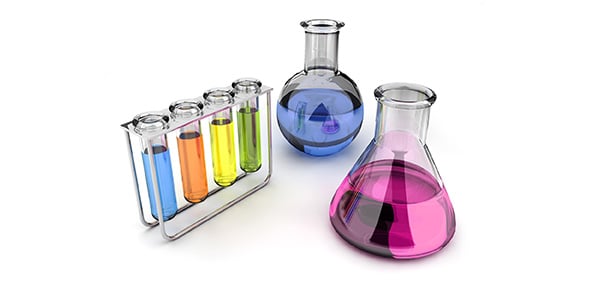Chemistry I Cp - Types Of Reactions
-
Calcium plus oxygen yields calcium oxide
-
Synthesis
-
Decomposition
-
Single replacement
-
Double replacement
-
Identify the types of chemical reactions shown in each example.

Quiz Preview
- 2.
Potassium iodide combines with lead II nitrate to produce lead II iodide and potassium nitrate
-
Synthesis
-
Decomposition
-
Single replacement
-
Double replacement
Correct Answer
A. Double replacementExplanation
In a double replacement reaction, the cations and anions of two different compounds switch places to form two new compounds. In this case, potassium iodide (KI) and lead II nitrate (Pb(NO3)2) react to form lead II iodide (PbI2) and potassium nitrate (KNO3). The potassium cation (K+) from potassium iodide combines with the nitrate anion (NO3-) from lead II nitrate to form potassium nitrate, while the lead II cation (Pb2+) from lead II nitrate combines with the iodide anion (I-) from potassium iodide to form lead II iodide. Hence, the reaction is a double replacement.Rate this question:
-
- 3.
Magnesium plus hydrochloric acid produces magnesium chloride and hydrogen
-
Synthesis
-
Decomposition
-
Single replacement
-
Double replacement
Correct Answer
A. Single replacementExplanation
In a single replacement reaction, one element replaces another element in a compound. In this case, magnesium (Mg) replaces hydrogen (H) in hydrochloric acid (HCl) to form magnesium chloride (MgCl2) and hydrogen gas (H2). This reaction can be represented by the equation: Mg + 2HCl -> MgCl2 + H2.Rate this question:
-
- 4.
Sodium bromide reacts with fluorine to produce sodium fluoride and bromine gas
-
Synthesis
-
Decomposition
-
Single replacement
-
Double replacement
Correct Answer
A. Single replacementExplanation
In a single replacement reaction, one element replaces another element in a compound. In this case, sodium bromide (NaBr) reacts with fluorine (F2) to produce sodium fluoride (NaF) and bromine gas (Br2). The sodium atom in sodium bromide is replaced by the fluorine atom, resulting in the formation of sodium fluoride, while the bromine atom is released as bromine gas. Therefore, the given reaction is an example of a single replacement reaction.Rate this question:
-
- 5.
Barium hydroxide combines with aluminum sulfate to produce aluminum hydroxude and barium sulfate
-
Synthesis
-
Decomposition
-
Single replacement
-
Double replacement
Correct Answer
A. Double replacementExplanation
In a double replacement reaction, the cations and anions of two different compounds switch places to form two new compounds. In this case, barium hydroxide (Ba(OH)2) combines with aluminum sulfate (Al2(SO4)3) to produce aluminum hydroxide (Al(OH)3) and barium sulfate (BaSO4). The cations (Ba and Al) switch places, as well as the anions (OH and SO4), resulting in the formation of two new compounds. Therefore, the given reaction is an example of a double replacement reaction.Rate this question:
-
Quiz Review Timeline (Updated): Mar 22, 2022 +
Our quizzes are rigorously reviewed, monitored and continuously updated by our expert board to maintain accuracy, relevance, and timeliness.
-
Current Version
-
Mar 22, 2022Quiz Edited by
ProProfs Editorial Team -
Dec 04, 2008Quiz Created by
Jlee
Reaction Types Quiz: How Much You Know?
A chemical reaction is a method that handles the chemical conversion of one chemical substance set to another. It encompasses changes that only include electrons' positions in...
Questions:
10 |
Attempts:
213 |
Last updated:
Mar 21, 2023
|
Chemical Reaction And Equation Quiz!
How good are you at chemistry? Play this informative quiz on Chemical Reactions and Equations to find the answer. This quiz contains various questions ranging from easy,...
Questions:
30 |
Attempts:
4174 |
Last updated:
Dec 22, 2023
|
Chapter 1 Chemical Equations And Reactions
This quiz evaluates understanding of chemical reactions, focusing on topics like electrolysis, reaction types, and oxidation-reduction processes. It tests knowledge essential for...
Questions:
10 |
Attempts:
77 |
Last updated:
Feb 23, 2023
|
Chemical Reactions And Equation Class 10th
This educational assessment focuses on chemical reactions, tailored for students in class 10. It evaluates understanding of reaction types, color changes in reactions, gas...
Questions:
10 |
Attempts:
3793 |
Last updated:
Feb 23, 2023
|
Chemical Reactions And Equations... I
Explore key concepts in chemistry with the 'Chemical Reactions And Equations... I' quiz. This quiz assesses understanding of reaction outcomes, such as precipitate formation,...
Questions:
10 |
Attempts:
67 |
Last updated:
Feb 23, 2023
|
Chemical Reactions And Equations
Explore the fundamentals of chemical reactions and equations through this quiz. Assess your understanding of reaction outcomes, decomposition processes, and formula validation....
Questions:
10 |
Attempts:
84 |
Last updated:
Feb 23, 2023
|
 Back to top
Back to top








